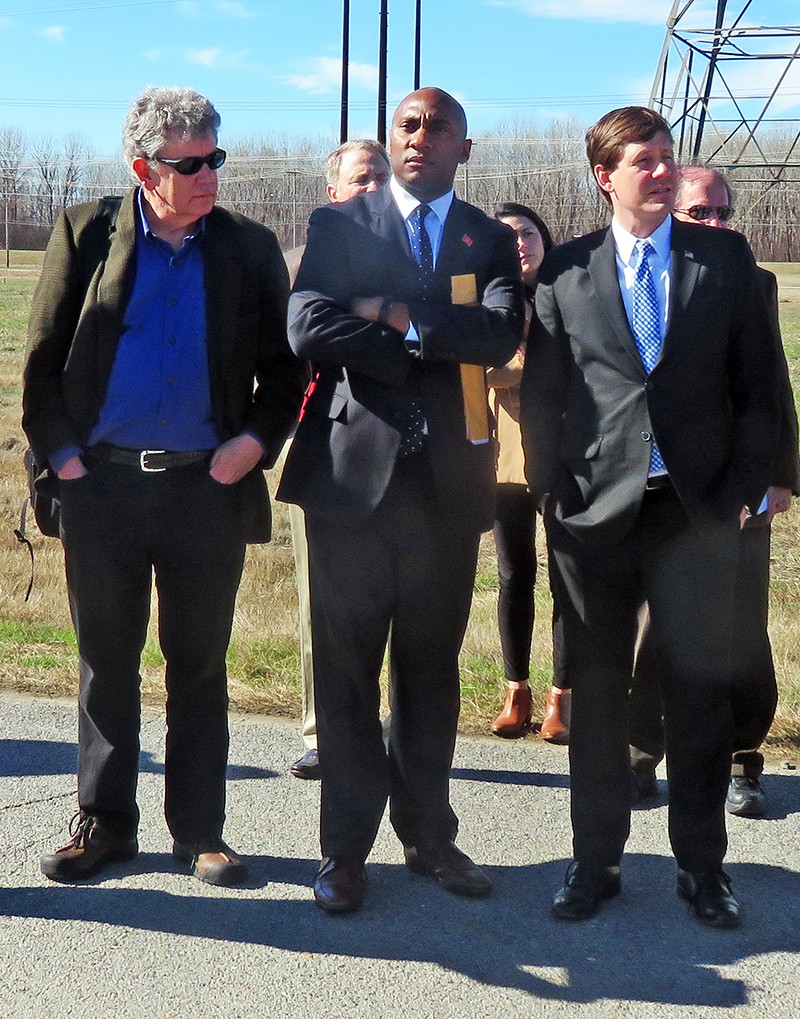The issue of the Tennessee Valley Authority’s drilling wells into the Memphis Sand aquifer may not be a done deal, after all. Though TVA’s application to complete four wells into the aquifer to acquire water to use as coolant for its forthcoming natural-gas plant was seemingly given the go-ahead in November by the Shelby County Board of Water Quality Control, concerns remain in important political places — on the Memphis City Council and the Shelby County Commission — and in the Tennessee General Assembly.
A bipartisan duo of state senators from Shelby County — Democrat Lee Harris of Memphis and Republican Brian Kelsey of Germantown — last year made a point of expressing solidarity with local environmentalists on their fears of possible contamination of the aquifer and the need to resist the TVA drilling. On Tuesday, in tandem with a media contingent, they began a “fact-finding trip,” which began at the Center for Applied Earth Science and Engineering Research at the University of Memphis and included stops at MLGW’s Sheahan Pumping Station,and the current coal-burning TVA plant on President’s Island and TVA’s soon-to-be natural-gas plant there.
 Jackson Baker
Jackson Baker
Ward Archer and state Senators Lee Harris and Brian Kelsey at site of new TVA plant
• The final form of the Shelby County Commission’s legislative agenda, to be presented to the General Assembly by the county’s lobbyists, was achieved on Monday, with the unanimous approval of a brief addendum, apropos the city-county EDGE board, which is responsible for making industrial-development decisions. The resolution called for “a member of the governing body of the municipality where the Industrial Development Board (IDB) was created to serve as a voting board member of the IDB.” Currently, the city council and county commission each have a non-voting member on the EDGE board.
Conspicuously absent from the final legislative agenda, due to unresolved discord, was a previously floated item calling for approval of medical marijuana and a “second chance” policy for persons arrested for possession of minor amounts of pot. The General Assembly is expected to take up the issue of legalizing medical marijuana.
Put off again were two resolutions having to do with the Shelby County Board of Education’s efforts to balance its books. One resolution was to receive and file the board’s first quarter report for the year ending June 30th. Another would ratify and approve amendments to the board’s budget for fiscal year 2017, adding on expenditures of $217,389. Neither had achieved any consensus from the commission’s education committee last Wednesday.
• Citing what he said was a “critical need” for infrastructure improvements in the county and its municipalities, Shelby County Mayor Mark Luttrell endorsed Tennessee Governor Bill Haslam‘s proposed seven percent increase in the state’s gasoline tax in an appearance at the commission’s Monday meeting. The proposed tax hike would enable work to begin on a backlog of $10 billion worth of infrastructure projects that Haslam and Commissioner John Schroer of the Tennessee Department of Transportation deem long overdue but undone for lack of funding.
Along with new fees on electric vehicles and rental cars, the proposed tax increase would pay for an overhaul plan, which the governor has given the name “The IMPROVE Act” (“Improving Manufacturing, Public Roads, and Opportunities for a Vibrant Economy”).
The governor’s proposal calls for the gasoline-tax increase to be accompanied by a half-cent reduction in the state sales tax on groceries, by $113 million in cuts to the state’s business taxes, and by cuts to the Hall Income Tax.
Luttrell said that Haslam’s proposal called for more than $9 million to be spent in Shelby County and in the county’s several municipalities. “There will be some opposition to it in the General Assembly,” Luttrell cautioned, adding that he would be coming back to the commission seeking “a more formal resolution for support” once the proposed measure was in its final form.